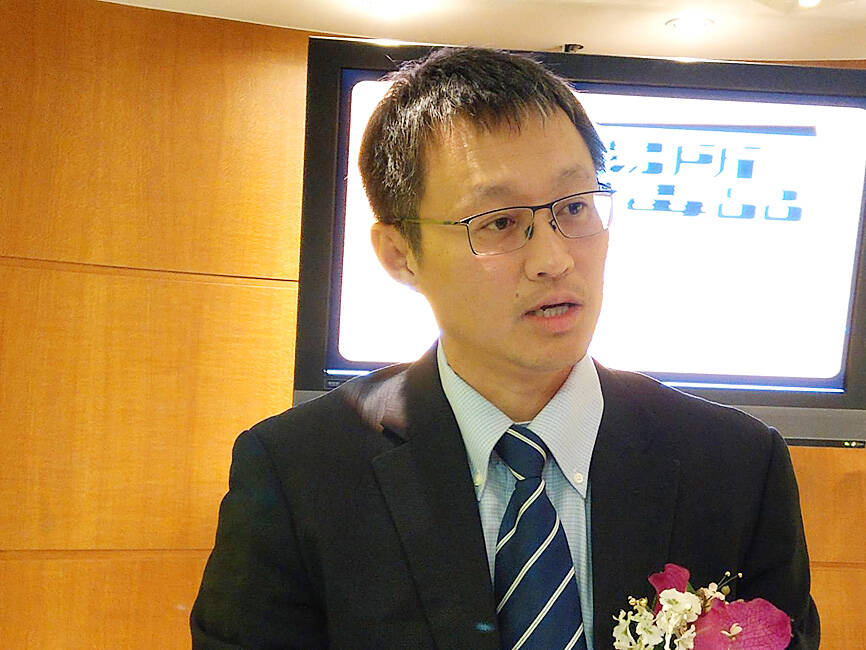NAND flash memory controller supplier Phison Electronics Corp (群聯電子) on Tuesday said it is scouting sites in Malaysia to set up a new research and development (R&D) center at the request of customers to diversify from China.
Since the US imposed an export ban on semiconductors to China in October last year, Taiwanese chip companies, including Phison, have faced requests from customers to diversify their manufacturing sites and R&D activities to boost supply chain resilience.
“We are in the process” of building an overseas R&D hub, Phison founder and CEO Pua Khein-seng (潘健成) said in Hsinchu. “It is relatively easier for us to build one in Malaysia.”

Photo: Vanessa Cho, Taipei Times
The new center might share part of the workload at the company’s R&D hub in Miaoli County, while an R&D center in the US focuses on developing high-end products, Pua said.
Building a new R&D team from scratch is an uphill task and time-consuming, said Pau, a Malaysian.
It is even harder to build one outside Taiwan, which has spent 45 years to develop a comprehensive chip ecosystem and supply chain that is rarely seen elsewhere in the world, he said.
Pua did not disclose a timeline for the Malaysian R&D center, but said customers from the US, Europe and Japan have been calling for it to diversify.
A chronic shortage of talent in Taiwan is another factor that prompted Phison to consider offshoring. As most technology companies in Taiwan are struggling to recruit skilled engineers, Phison sought to tackle the talent gap overseas, Pua said.
“Building overseas R&D centers and introducing overseas talent are vital for Taiwan to address the talent shortage,” Pua said.
As of last year, Phison had 2,891 R&D engineers, accounting for 76 percent of its total workforce of 3,800.
Asked about the NAND industry’s outlook, Pua said that chip design houses face a bumpy road ahead, but added that market demand should pick up in the second half of this year, after pausing for six to nine months due to macroeconomic uncertainty and inventory correction.
Demand has been recovering at a faster pace lately, as NAND flash memory chips have become much more affordable, he said.
Phison will not follow in the steps of US companies and cut jobs, although the company expects profit and revenue to decline this year, Pua said, adding that it would raise wages and pay bonuses as usual this year.
Phison’s net profit last year plummeted 39 percent to NT$5.17 billion (US$169.8 million) from NT$8.43 billion in 2021, with earnings per share dropping to NT$27.71 from NT$41.34.
The company attributed the fall to significant losses at its Chinese subsidiary due to weak demand and logistics disruption amid the COVID-19 pandemic.

MULTIFACETED: A task force has analyzed possible scenarios and created responses to assist domestic industries in dealing with US tariffs, the economics minister said The Executive Yuan is tomorrow to announce countermeasures to US President Donald Trump’s planned reciprocal tariffs, although the details of the plan would not be made public until Monday next week, Minister of Economic Affairs J.W. Kuo (郭智輝) said yesterday. The Cabinet established an economic and trade task force in November last year to deal with US trade and tariff related issues, Kuo told reporters outside the legislature in Taipei. The task force has been analyzing and evaluating all kinds of scenarios to identify suitable responses and determine how best to assist domestic industries in managing the effects of Trump’s tariffs, he

TIGHT-LIPPED: UMC said it had no merger plans at the moment, after Nikkei Asia reported that the firm and GlobalFoundries were considering restarting merger talks United Microelectronics Corp (UMC, 聯電), the world’s No. 4 contract chipmaker, yesterday launched a new US$5 billion 12-inch chip factory in Singapore as part of its latest effort to diversify its manufacturing footprint amid growing geopolitical risks. The new factory, adjacent to UMC’s existing Singapore fab in the Pasir Res Wafer Fab Park, is scheduled to enter volume production next year, utilizing mature 22-nanometer and 28-nanometer process technologies, UMC said in a statement. The company plans to invest US$5 billion during the first phase of the new fab, which would have an installed capacity of 30,000 12-inch wafers per month, it said. The

Taiwan’s official purchasing managers’ index (PMI) last month rose 0.2 percentage points to 54.2, in a second consecutive month of expansion, thanks to front-loading demand intended to avoid potential US tariff hikes, the Chung-Hua Institution for Economic Research (CIER, 中華經濟研究院) said yesterday. While short-term demand appeared robust, uncertainties rose due to US President Donald Trump’s unpredictable trade policy, CIER president Lien Hsien-ming (連賢明) told a news conference in Taipei. Taiwan’s economy this year would be characterized by high-level fluctuations and the volatility would be wilder than most expect, Lien said Demand for electronics, particularly semiconductors, continues to benefit from US technology giants’ effort

‘SWASTICAR’: Tesla CEO Elon Musk’s close association with Donald Trump has prompted opponents to brand him a ‘Nazi’ and resulted in a dramatic drop in sales Demonstrators descended on Tesla Inc dealerships across the US, and in Europe and Canada on Saturday to protest company chief Elon Musk, who has amassed extraordinary power as a top adviser to US President Donald Trump. Waving signs with messages such as “Musk is stealing our money” and “Reclaim our country,” the protests largely took place peacefully following fiery episodes of vandalism on Tesla vehicles, dealerships and other facilities in recent weeks that US officials have denounced as terrorism. Hundreds rallied on Saturday outside the Tesla dealership in Manhattan. Some blasted Musk, the world’s richest man, while others demanded the shuttering of his